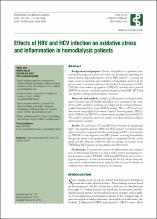Effects of HBV and HCV infection on oxidative stress and inflammation in hemodialysis patients
Künye
Avcı, E., Geldi ,M., Alp Avcı, G., Coşkun Cevher, Ş. (2018). Effects of HBV and HCV infection on oxidative stress and inflammation in hemodialysis patients. Periodicum Biologorum, 120(1), 33-40.Özet
Background and purpose: Chronic renal failure is a syndrome characterized by progressive and irreversible loss of nephrons depending on various diseases. Especially infection such as HBV and HCV is among the major causes of mortality and morbidity in hemodialysis patients.In the present study we aimed to determine the levels of 3-nitrotyrosine (3-NT), TNF-like weak inducer of apoptosis (TWEAK) and heat shock protein (HSP70) in chronic renal failure patients diagnosed with HBV, HCV and non-hepatitis undergoing hemodialysis treatment. Materials and methods: Samples of 235-patients receiving hemodialysis treatment and 25-healthy individuals were included in the study. Firstly, HBV and HCV positivity were diagnosed by serological Enzyme-Linked ImmunuSorbent Assay (ELISA) method. Then, 3-NT levels were determined using High-Performance Liquid Chromatography (HPLC), while TWEAK and HSP70 were determined using high sensitivity ELISA. The numbers of patients used in the studies were determined according to statistical power analysis. Results: The values of 3-NT and HSP70 were found to be significantly higher non-hepatitis patients, HBV and HCV patients receiving hemodialysis treatment to compared with the control group (p‹0.05). Concentration of TWEAK in non-hepatitis and HBV patients receiving hemodialysis therapy was found to be significantly higher to compared with the control group (p‹0.05). However, unlike the other two groups, an increase in the TWEAK of HCV patients on post-dialysis was determined. Conclusions: To prevent the increase of inflammation and oxidative stress in hemodialysis patients or to keep it under control, investigating certain parameters such as TWEAK, 3-NT and HSP70 from time to time is of great importance in terms of minimizing the level of risk for many diseases such as cardiovascular diseases. Infection also increases the burden on oxidative stress and immunity system in these patients. © 2018, Croatian Society of Natural Sciences. All rights reserved.


















